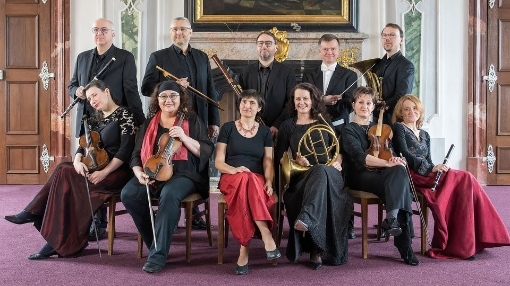The Musica Florea ensemble is preparing a new concert programme to be performed for the first time this April. This year marks the 170th anniversary of Leoš Janáček's birth, and to mark the occasion the ensemble has taken up his earliest compositions to set them alongside works from the early Italian Baroque. Musica Florea will be performing with conductor Mark Štryncl. The soloists will be Barbora Kabátková, Stanislava Mihalcová, Daniela Čermáková, Hasan El Dunia and Jaromír Nosek.
This year's anniversary of Leoš Janáček's birth is being celebrated as part of the Year of Czech Music by the Musica Florea ensemble, whose repertoire now includes works from the Renaissance to Romanticism. The new programme will present the composer's early works. Leoš Janáček learned basso continuo and counterpoint from the age of 11, and gradually became familiar with Baroque and Renaissance compositional techniques. He embodied them mainly in small liturgical vocal compositions on Latin texts or in several polyphonic compositions that have only recently been discovered. A certain unobtrusive innovation in these early compositions bears the mark of the period when music was transitioning from the Renaissance to the Baroque. Baroque brought an emphasis on emotion and became a time during which new means and forms of expression were discovered. The concert entitled The Unknown Leoš Janáček and the Beginnings of Baroque will take place on 10 April 2024 at 19:00 in the Convent of the Merciful Brothers.
“It is obvious that the liturgical compositions of the barely twenty-year-old Leoš Janáček were written independently, over and above his school duties and curricula. They were often based on Gregorian chants, with the organ added to the singers' voices in a few cases, yet maintaining only a supporting role," conductor Marek Štryncl explains. “Therefore, we have taken the liberty of enriching the accompaniment with string instrumentation, without adding or detracting anything from the composer'' intention."
The programme will be supplemented with works by composers from the early Italian Baroque and previous periods. As listeners will hear for themselves, Janáček's early compositions are of a similar character, testifying to his high sense of compositional style, which captivated him as if the gap of centuries between them did not exist at all. Alongside Janáček, Giovanni Gabrielli, Alessandro Grandi, Gregorio Allegri, Giovanni Battista Bovicelli and Giovanni Valentini will also be heard. The Musica Florea ensemble will perform as a chamber ensemble with guest soloists: Barbora Kabátková and Stanislava Mihalcová (soprano), Daniela Čermáková (alto), Hasan El Dunia (tenor) and Jaromír Nosek (bass).
Musica Florea: The Unknown Leoš Janáček and the Beginnings of Baroque
Featuring: Musica Florea and soloists, conductor: Marek Štryncl
Soprano: Barbora Kabátková, Stanislava Mihalcová, alto: Daniela Čermáková, tenor: Hasan El Dunia, bass: Jaromír Nosek
Programme:
Leoš Janáček (1854-1928): Introitus In nomine Iesu
Giovanni Gabrielli (1554-1612): Canzon à 5
Leoš Janáček: Suscepimus Deus, Regnum mundi
Alessandro Grandi (1586–1630): Sonata SOPRA DEUS MISERATUR NOSTRI
Gregorio Allegri (1582–1652): Falsobordone – Miserere
Giovanni Valentini (1582–1649): Sonata à 5
Leoš Janáček: Exaudi Deus
Leoš Janáček: Fugue in A Major
Leoš Janáček: Exurge Domine, Communio – Fidelis servus
Marco Uccellini (1603–1680): Sinfonia decima nona à 4
Giovanni Battista Bovicelli (1550–1594) / Gabucci, Giovanelli: Falsobordone – Magnificat











No comment added yet..